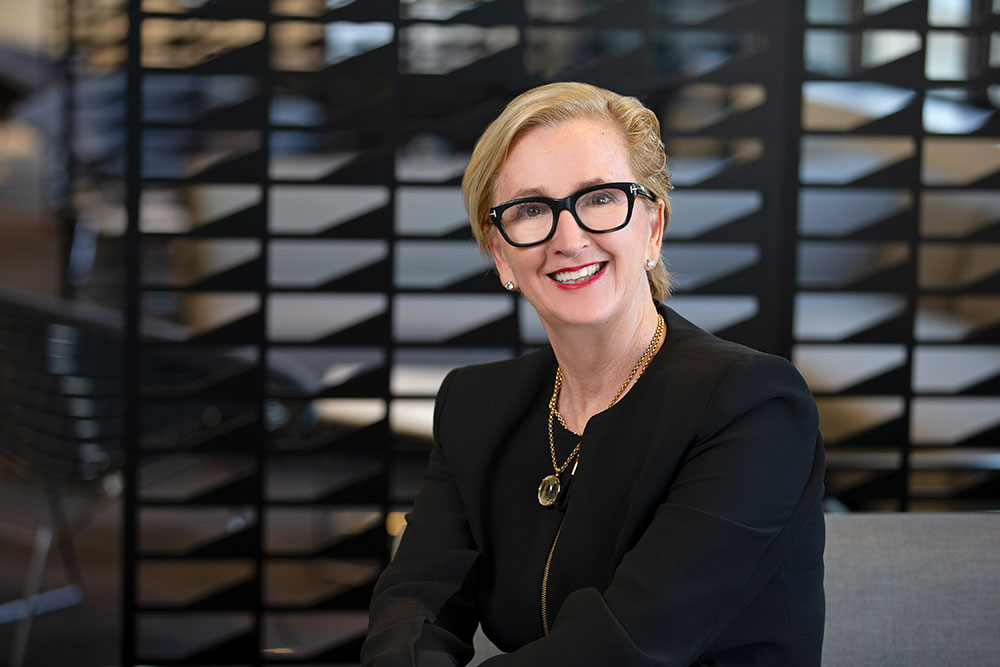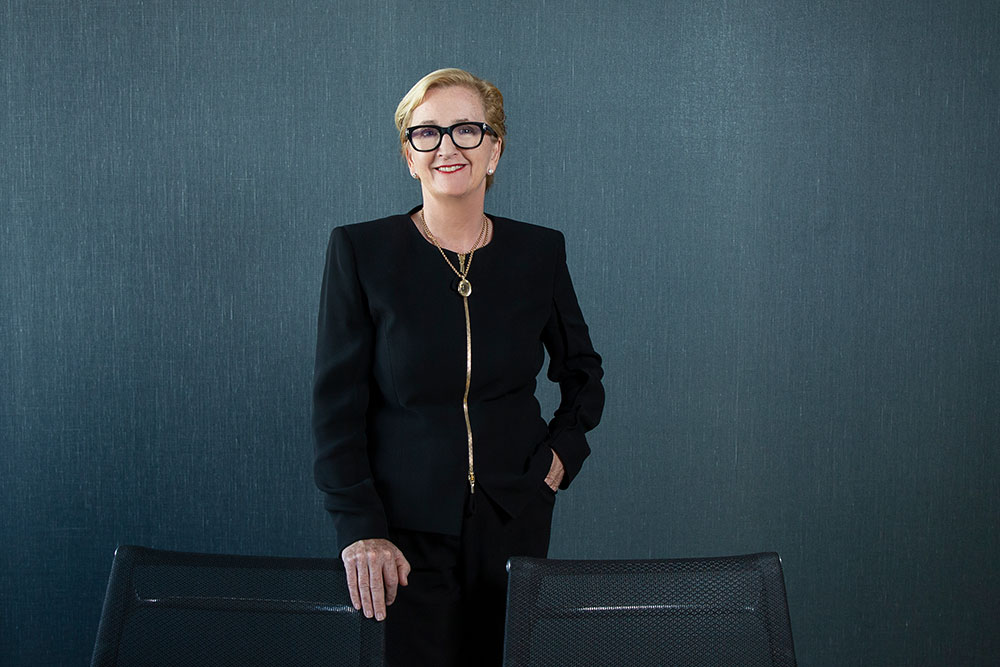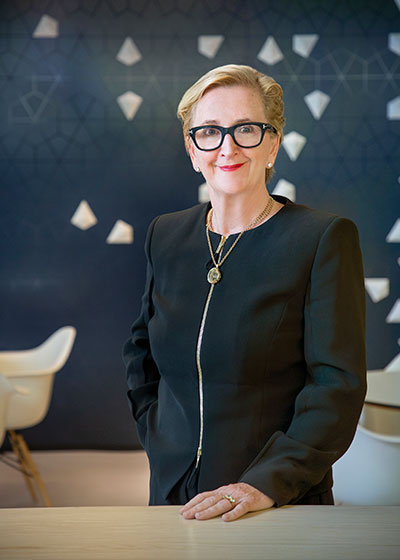When she left university, and before a string of high-profile roles across the major investment banks and the big four banks, Cathryn Carver joined Perth commodities broker Crombie and Nicholas. Commodities broking could be a tough, blokey environment.
“The industry wasn’t into diversity in a big way,” she says. “It was very, very male dominated. You [women] were a minority.”
But out of the searing experience, Carver began to form a management philosophy. “It really influenced my leadership style. It really started shaping my thoughts about the right environment for people to excel.”
In her role as NAB’s Executive – Client Coverage in Corporate & Institutional Banking (C&IB), that leadership philosophy and style was tested like never before in 2020 during the COVID-19 pandemic.
“Leadership under these conditions was so much deeper and broader than anything I’d experienced before,” she says. “It was crisis management.”
Carver was faced with helping to guide, not only C&IB’s team of around 2,000 employees, but also her corporate and institutional clients through a once-in-a-generation-storm.
But Carver says there was an upside to the pandemic: it taught leaders, organisations, and the nation important lessons that, if heeded, will make all parts of the economy more resilient to shocks and crises.
And the superannuation industry is a major beneficiary of those lessons, Carver says, particularly around managing liquidity and also funds’ vital role in investing in job-creating assets and infrastructure to aid Australia’s economic recovery. “They [super funds] will continue to play a really important role in terms of helping Australia get back on its feet,” she says.
 Photography by Aran Anderson.
Photography by Aran Anderson.
Starting with a good work ethic
Carver grew up in Perth where her father ran a number of successful panel-beating businesses. At just ten years of age, Carver was doing wages for the business. “I got really into it. The work ethic was there.”
She gained further inspiration from her uncle who had become a senior executive in the US with hotel giant, Ramada. “I wanted to get involved in business in some capacity. My father encouraged me, he didn’t focus on gender, it was whether you delivered, worked hard and worked smart.”
Carver studied economics at the then West Australian Institute of Technology, now Curtin University, before joining Crombie and Nicholas. After a short stint there, she moved to Sydney, taking a role at investment bank Capel Court.
She then held positions at Advance Bank, Macquarie (Head of Capital Markets), Westpac and ANZ (Global Head of Capital Markets and Senior Managing Director of International and Institutional Banking), before joining NAB in 2016.
One of her career highlights was shifting her whole family to Hong Kong to establish ANZ’s global capital markets business. But she says she has experienced her “greatest growth” in her current role at NAB, where she oversees banking relationships for all of NAB’s corporate and institutional banking globally.
Carver says her role is complex because it requires bringing all NAB’s products and services to those clients, which requires influencing a lot of people and “co-creating”. “It’s multi-product, so that means making sure that ‘conductor’ role for the relationship happens and happens well.”
The old management model of control by having everything sit in an executive’s business unit doesn’t work, Carver says. Instead, Carver has adopted a management and leadership philosophy she began formulating at the commodities broker right out of university, a philosophy that combines commercial savvy with empathy.
“You need to use EQ [emotional intelligence] skills to get the kind of outcomes that you need to,” she says. “You need commercial savvy and toughness; but you still need to have a lot of empathy for clients and colleagues.”
The management philosophy has delivered strong results. Carver’s division is number one in terms of net promoter score—the percentage of clients who say they would recommend the company—with clients. But her division is also in the top quartile when it comes to colleague engagement. “I’m proud about those two things – what our clients say and what our colleagues say.”
I’m proud about those two things – what our clients say and what our colleagues say.
Carver’s management and leadership stance and style was first tested by the global financial crisis (GFC) when she was running global corporate finance at ANZ. “My biggest memory of that time was the significance of the impact on global financial markets,” she says. “The commercial paper market, the largest funding market in the world, was closed for 24 hours. They were extraordinary times and defining times from a client relationship perspective. We were truly there for our clients.”
The GFC reinforced something Carver had learned: that you must make sure your business is always in good shape. “If it’s not in good shape, in tough times, when you have a crisis, you’re more vulnerable.”
Being in ‘good shape’ isn’t just financial shape, Carver says. “It’s what you’re doing for clients, doing for your people and colleagues and making sure they’re fully engaged, but also having an eye on tomorrow as well as today.”
It’s what you’re doing for clients, doing for your people and colleagues and making sure they’re fully engaged, but also having an eye on tomorrow as well as today.
“I call it the juggle,” she adds.
But for Carver, as for many, COVID-19 turned into the ultimate juggle. It was all pervasive, affecting clients, markets, employees, and everyone’s day-to-day lives.
Carver had to manage NAB’s liquidity envelope and ensure that available funding was heading to where it was most critical for clients. She also had to keep communicating with clients, and to try and keep her people, and clients, safe. “You were trying to do all that at once.”
 Photography by Aran Anderson.
Photography by Aran Anderson.
Essential ingredients for successful crisis management
When it comes to crisis management, Carver says the key is firstly getting the right people around the table. Then “massively prioritising” what is important above anything else. But also staying incredibly connected with clients and her team. “As the pandemic situation changed so quickly around Australia and across the world, prioritising and reviewing those plans became a weekly, sometimes even daily necessity to ensure we were fully across what clients in different industry sectors needed at a particular time.”
Being clear and decisive was vital and allowed Carver to communicate clearly that “we can get through this”, “we are in this together”, “this is what we need to do”, “this is how we’re going to do it”, and “this is when we’re going to do it”.
But it also “required having a sense of real empathy … and a bit of humour.”
Carver says a major lesson from the COVID-19 crisis was around engagement between the government and private sector. COVID required different organisations and ‘different ecosystems’ to work together, and she believes there is an opportunity for Australia to keep leveraging that. “There are great collaboration opportunities for business and government, for example, around fighting financial crime, further refinement of the regulatory environment, sustainability, digitisation and data use, and building infrastructur
e.”
There are great collaboration opportunities for business and government, for example, around fighting financial crime, further refinement of the regulatory environment, sustainability, digitisation and data use, and building infrastructure.
But another major lesson from the pandemic was the importance of liquidity. Carver says that Australia was well managed going into COVID-19, with corporates not heavily leveraged.
With the early release of super, liquidity also became a major focus for some super funds impacted hardest, including those with members in the tourism, hospitality and retail.
Carver says NAB shared its knowledge with funds during the crisis. That included exploring alternative liquidity sources such as insurance companies, the Reserve Bank, the super industry more broadly, and trying to structure solutions for super funds within the confines of the SIS Act.
“In the end though the Super Funds managed their liquidity needs brilliantly,” she says.
But Carver says we should still “consider having some sort of retrospective look into how the system dealt with liquidity during this period because the lessons learned could benefit Australia as a whole in times of financial turmoil which COVID-19 and the GFC have highlighted”.
“That [liquidity] will be a focus area for super funds, obviously respecting there will be differences in circumstances and how they handle that,” she adds.
Assisting Australia’s economic growth post-COVID
Emerging from the crisis, Carver says the superannuation industry has a big part to play in helping drive an economic recovery. “They have a huge role in contributing to Australia and other parts of the globe in terms of their ability to really help with the growth proposition; contributing both equity and debt capital to both infrastructure and social projects along with corporates.”
Carver says super funds have already been investing strongly in infrastructure and real estate. “The challenge is how they go to market – do they do it themselves, partner with people like ourselves, or give it to funds?
“We have a very strong focus on the funds industry and often wonder how we can be doing more together holistically. What synergistic benefits can the banking and funds sectors deliver which ultimately benefit all Australians?”
No doubt that will form part of the conversations Carver will have when she attends the ASFA Conference early in the new year. “I’m looking forward to seeing everyone at the Conference,” she says. “It’s always a great place to connect with our super fund clients and others in the industry to share ideas on how we can better support each other to deliver great retirement outcomes for members and drive further growth and development for Australia.”
It’s always a great place to connect with our super fund clients and others in the industry to share ideas on how we can better support each other to deliver great retirement outcomes for members and drive further growth and development for Australia.

Farewelling 2020 and looking ahead
As 2020 ends, Carver says that coming into Christmas, “people are pretty exhausted” after an extremely difficult year.
“It’s been an intense period and really tough. It’s been massively challenging. And people are still trying to put their best foot forward and meet deadlines.
“The reality is that whilst we feel we’re in reasonably good shape from a health perspective we have still got to stay vigilant. I hope like crazy we will get a vaccine in the second quarter or thereabouts, but we have got to stay alert to any curve balls.”
One of the benefits of COVID-19 has been flexibility. Carver now works three days in the office and two at home. She says that work-life balance has always been a challenge. “I very much morph personal and work together.”
But she focuses on exercise, including running and walking her two daschunds (important members of the family), to “help clear her head”, as well as digital detoxing. “When you go to have quiet time outside of work, it’s really important not to have devices around.“
For now, post-crisis, Carver says she is focused on making sure NAB is “number one” with their clients.
That means working with clients in a strategic way to genuinely help as part of NAB’s mission and vision: to serve its customers well and help communities prosper. “We’re here trying to make a difference to those communities,” Carver says, adding a focus will be helping finance infrastructure to help drive jobs growth.
While 2020 has been an intense year for Australians, NAB and Carver, she is focused on the future and implementing her management and leadership philosophy she began to forge in the tough Perth commodities broking scene.
“I love running businesses,” Carver says. “And I love a good challenge. NAB is an awesome organisation which is doing some great things under CEO Ross McEwan’s leadership, I have certainly got lots of challenges here. I have always wrapped my arms around continuing to grow and think about different executive roles.”




































